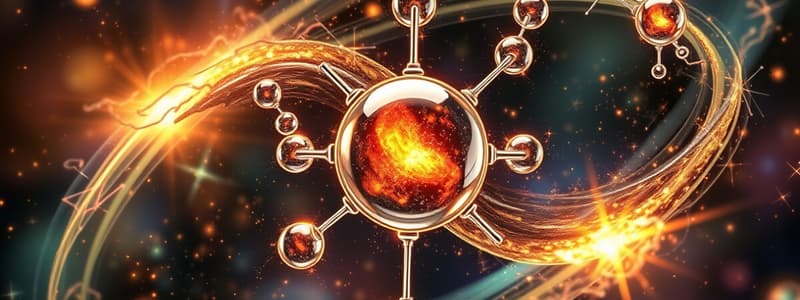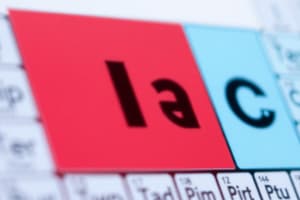Podcast
Questions and Answers
What is the number of protons in Hydrogen?
What is the number of protons in Hydrogen?
- 1 (correct)
- 0
- 3
- 2
How many protons does Helium have?
How many protons does Helium have?
2
How many neutrons are in Lithium?
How many neutrons are in Lithium?
4
What is the electron count for Beryllium?
What is the electron count for Beryllium?
How many electrons does Boron have?
How many electrons does Boron have?
What is the neutron count in Carbon?
What is the neutron count in Carbon?
How many protons and electrons does Nitrogen have?
How many protons and electrons does Nitrogen have?
What is the total number of neutrons in Oxygen?
What is the total number of neutrons in Oxygen?
What is the electron count for Fluorine?
What is the electron count for Fluorine?
How many protons are present in Neon?
How many protons are present in Neon?
Sodium has how many neutrons?
Sodium has how many neutrons?
What is the electron count for Magnesium?
What is the electron count for Magnesium?
How many neutrons does Aluminium have?
How many neutrons does Aluminium have?
What is the number of protons in Silicon?
What is the number of protons in Silicon?
Phosphorus has how many electrons?
Phosphorus has how many electrons?
What is the neutron count in Sulfur?
What is the neutron count in Sulfur?
How many protons does Chlorine have?
How many protons does Chlorine have?
What is the number of neutrons in Argon?
What is the number of neutrons in Argon?
Potassium has how many protons?
Potassium has how many protons?
How many neutrons does Calcium have?
How many neutrons does Calcium have?
Flashcards are hidden until you start studying
Study Notes
First 20 Elements Overview
- Hydrogen (H): Simplest element with 1 proton, 1 electron, and no neutrons.
- Helium (He): Light noble gas consisting of 2 protons, 2 electrons, and 2 neutrons.
- Lithium (Li): Alkali metal featuring 3 protons, 3 electrons, and 4 neutrons.
- Beryllium (Be): Alkaline earth metal with 4 protons, 4 electrons, and 5 neutrons.
- Boron (B): A metalloid comprising 5 protons, 5 electrons, and 6 neutrons.
- Carbon (C): Fundamental element for life, consisting of 6 protons, 6 electrons, and 6 neutrons.
- Nitrogen (N): Essential component of amino acids; has 7 protons, 7 electrons, and 7 neutrons.
- Oxygen (O): Vital for respiration; contains 8 protons, 8 electrons, and 8 neutrons.
- Fluorine (F): Reactive halogen with 9 protons, 9 electrons, and 10 neutrons.
- Neon (Ne): Inert noble gas with 10 protons, 10 electrons, and 10 neutrons.
Continued Element Breakdown
- Sodium (Na): An alkali metal featuring 11 protons, 11 electrons, and 12 neutrons.
- Magnesium (Mg): An alkaline earth metal with 12 protons, 12 electrons, and 12 neutrons.
- Aluminium (Al): Common metal comprising 13 protons, 13 electrons, and 14 neutrons.
- Silicon (Si): A key semiconductor material with 14 protons, 14 electrons, and 14 neutrons.
- Phosphorus (P): Important for DNA and energy transfer; contains 15 protons, 15 electrons, and 16 neutrons.
- Sulfur (S): Essential for certain amino acids, featuring 16 protons, 16 electrons, and 16 neutrons.
- Chlorine (Cl): Reactive halogen with 17 protons, 17 electrons, and 18 neutrons.
- Argon (Ar): A colorless noble gas with 18 protons, 18 electrons, and 22 neutrons.
- Potassium (K): Key mineral for biological functions; includes 19 protons, 19 electrons, and 20 neutrons.
- Calcium (Ca): Crucial for bones and teeth, comprising 20 protons, 20 electrons, and 20 neutrons.
Studying That Suits You
Use AI to generate personalized quizzes and flashcards to suit your learning preferences.




